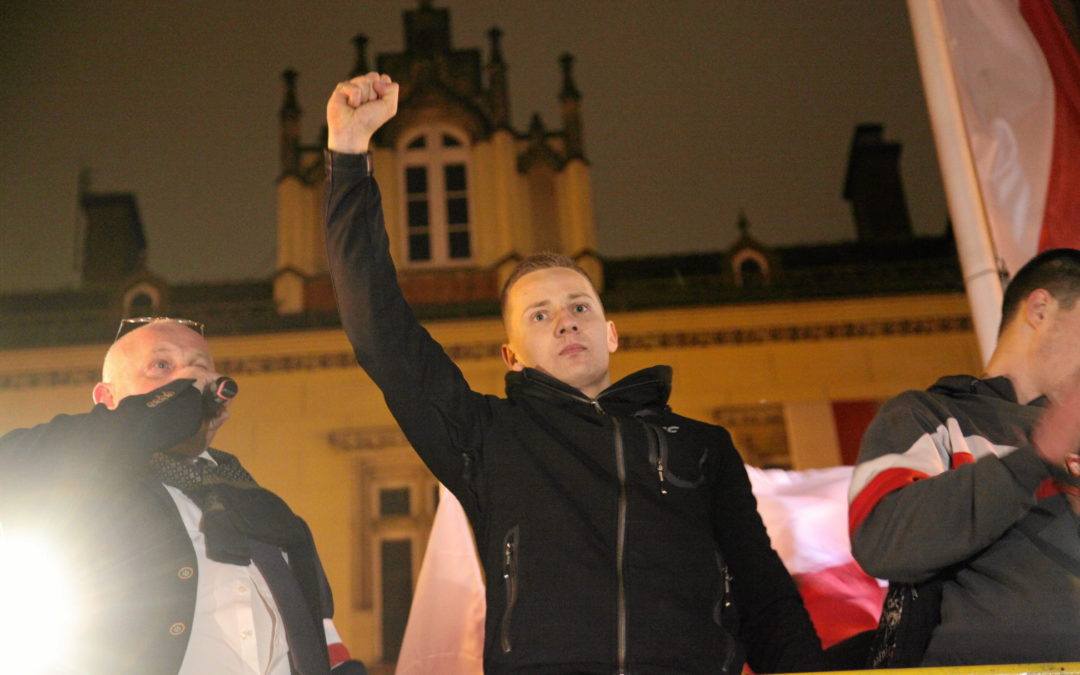Jacek Międlar, a suspended priest and far-right leader, has been detained by Poland’s Internal Security Agency (ABW) on suspicion of inciting hatred against Jews, a crime that carries a prison sentence of up to two years.
Międlar is a prominent and controversial figure, known for his antisemitic, Islamophobic and homophobic views. He has been banned from entering the UK due to his extremist activity, and has faced various court cases in Poland, one of which resulted in him being found guilty for suggesting that a female liberal MP deserved “the razor”.
News of his detention was announced on Friday morning by Grzegorz Braun, an MP from the far-right Confederation (Konfederacja), who said that armed ABW agents stormed Międlar’s home this morning in a “show of strength”. The information was confirmed by wprawo.pl, a nationalist website that Międlar works with.
Later in the day, Stanisław Żaryn, the spokesman for the minister in charge of the security services, announced that Międlar had been detained for questioning on suspicion of publicly inciting hatred but was then released, reports Wirtualna Polska. Międlar then attended a nationalist event in Wrocław on Friday evening.
Żaryn also explained that the suspicions against Międlar relate to an article published by wprawo.pl entitled “Poland in the shadow of Jewry”. The long and unsigned text focuses on the alleged threat Jews presented to Poland after it regained independence. It describes Jews as Poland’s “most vicious enemy”, who intended to “mutilate and enslave Poland”.
The anonymous author calls on Poles, as “representatives of the Holy White Race” with “Aryan blood” in their veins, to “take up arms” to defend themselves from “our fifth column”. The article finishes with the words “death to enemies of the fatherland”.
Międlar was ordained as a priest in 2015, and quickly became associated with nationalist organisations. In the same year, he addressed the crowd at Warsaw’s Independence March, which is organised by far-right groups.
In April 2016, Międlar led a mass in Białystok Cathedral organised by the National Radical Camp (ONR). During the sermon, he warned that a “Jewish mob want to bring you to your knees, to grind, swallow, digest and in the end spit you out”. He declared that “uncompromising national-Catholic radicalism” is the best “chemotherapy” for Poland’s “cancer”.
Though his sermon was reported to the authorities for inciting hatred against Jews, prosecutors decided not to bring charges, claiming that his words had been “taken out of context”.
Later the same year, speaking at Wrocław’s Independence March, he called on “patriots to defeat the leftism, Jewishness and communism which still prevail in our homeland”, warning that otherwise “Poland [will] once again be destroyed by Talmudic Jews”. However, resultant charges against him were dropped at the request of the National Prosecutor’s Office.
Międlar’s extreme views did, however, lead him to be suspended by the church. They also resulted in him twice being refused entry to the UK, where he had been due to speak to Polish audiences as well as at a rally organised by far-right group Britain First.
Britain’s Foreign and Commonwealth Office commented that it “expects people coming to the UK to respect our common values” and can “block the entry of a person if his or her presence in the UK does not serve the public good”.
Earlier this year, it was reported that Międlar was being investigated by police over a video in which he said that Brenton Tarrant, who killed 51 people in a terrorist attack on mosques in Christchurch, New Zealand, “had some right” to do what he did because he was “defending White Europe[ans]” from mixing with other races.
Last month, Międlar led a far-right march in Wrocław on Independence Day that was almost immediately called off by police due to antisemitic chants. In response, Międlar shouted “you won’t stop us” and participants then refused to disperse, resulting in a stand off during which flares, bottles and stones were thrown at the police.
This text was updated at 11:16 on 14 December 2020 to take account of new developments.
Main image credit: Mieczyslaw Michalak/Agencja Gazeta

Daniel Tilles is editor-in-chief of Notes from Poland. He has written on Polish affairs for a wide range of publications, including Foreign Policy, POLITICO Europe, EUobserver and Dziennik Gazeta Prawna.




















